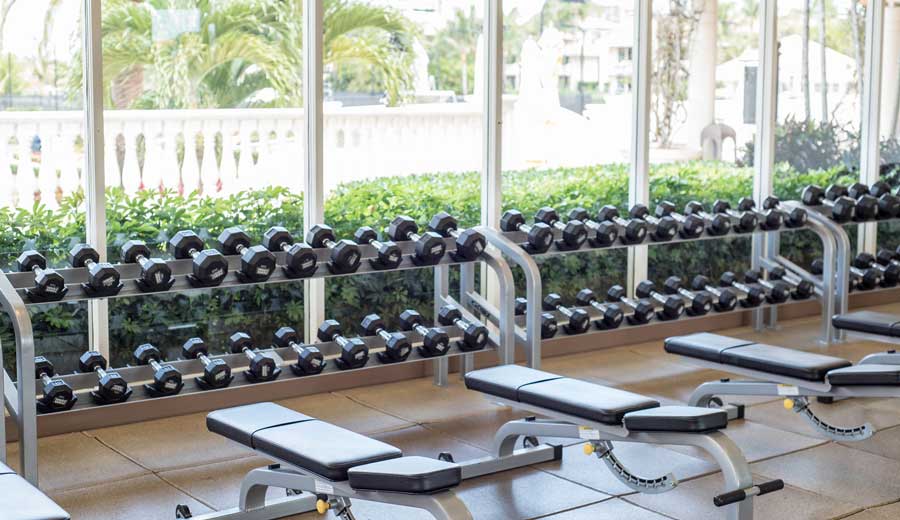Can You Get Sick from the Gym?
How to Avoid Germs at the Gym
Sweat dripping off handle bars of the treadmill can make you stop and wonder, are there germs at the gym you should be avoiding? Get the best workout, either at the gym, park or at home, and stay health with advice from Pritikin’s Fitness Expert, Jamie Costello.

Is the gym full of germs?
Experts put the gym to the test. Taking bacterial and viral culture swabs of surfaces at the gym where people put their hands, researchers found little risk of exposure to pathogenic bacteria on exercise equipment. However, there are a lot of rhinoviruses (runny nose causing viruses -the common cold) hidden at the gym. The Center for Disease Control says the best way to not catch the common cold is to avoid touching your eyes, nose, and mouth with unwashed hands. The average adult touches their face 23 times per hour, with about half of those being to mucosal surfaces such as the eyes, nose or mouth. No wonder, adults get 2 to 3 colds per year; kids experience even more!
How do you avoid germs in the gym?
Since heading to the bathroom between sets to wash your hands isn’t feasible, while at the gym, “Don’t touch your face,” advises Jamie Costello, VP Sales & Fitness at Pritikin Longevity Center and Spa. “Wipe down equipment with disinfectant to help reduce your risk of getting sick; but, it won’t prevent it completely… most humans have good immune systems that can be kept healthy with healthy eating, rest, and hydration, while avoiding excessive alcohol consumption, and stress.” If you’re working out at local outdoor gyms, the park or in your condo exercise room, be sure to wipe down equipment, wash your hands and avoid touching your face so you can stay healthy.

Avoid germs at the gym by washing your hands
Add hand washing to the beginning and end of every workout. Make it part of your routine. Perhaps, you should take more time than you typically do though. University of Michigan researchers found most people only scrub and lather their hands for 6 seconds – the Center for Disease Control advice for hand washing is at least 20 seconds. Not sure how long that is? Singing Happy Birthday takes a mere 10 seconds – you’d do best to sing it twice. Go ahead and sing it loud and proud while you wash your hands (or, sing it in your head if you’re worried you’ll break the mirrors).
Exercise can prevent you from getting sick
It is possible that when exercise is done at the right intensity and frequency, it may help prevent you from getting sick. According to the British Journal of Sports Medicine, exercising regularly makes you less likely to get a cold. The benefit to those who exercised was significant – it cut the risk of getting sick in half. Wow! Exercise really is good for you.
However, not all studies suggest exercising will keep you from getting sick. In fact, researchers have noted a decline in the immune system after intense durations of exercise. Theories suggest this may be a way for the body to limit inflammation after intense bouts, but could also increase the risk of the common cold. Similarly, you are more likely to get sick from the gym if you’re “…burning the candle at both ends, not getting enough sleep, and then working out near someone who is sick,” remarked Jamie.
Is it bad to exercise when sick?
Medical experts suggest, if you have a fever or chest cold, you need to rest and drink plenty of fluids – skip the gym until you feel better. In general, if you are sick, you should seek the advice of a physician.
Can exercise help when you’re sick?
The common rule of thumb is that if your illness is above the neck, (runny nose, sore throat) it’s okay to do some light exercising. The idea of ‘sweating it out’ isn’t backed by science, but some physical activity can at times help improve the movement of mucous in the nose and sinuses. “If you have a head cold, with no fever, some recovery style exercise at home, light activity and stretching, can help you feel better – don’t go to the gym and get other people sick,” explains Jamie. Together, we can reduce the spread of viruses by being conscious of spreading germs.
What to do if you can’t go to the gym
Are you avoiding the gym because of germs? Going to the gym isn’t the only way to exercise! Depending on where you live or work, you can use spaces in your office building (stairs), home or a nearby park to workout in. At home, body weight and band routines, flexibility exercises, as well as core routines, can be done. It can be as simple as using a step, that can slide under your bed, and double up as a bench if you have a couple of free weights. “There are dance videos that are lots of fun,” adds an excited Jamie. “There are lots of steaming videos for cardio, or choreographed routines online… weight bearing and low impact videos are best.” You can also do your own thing!
Why do I feel sick after going to the gym?
If you feel sick after going to the gym, it’s not likely because of germs at the gym. Feeling dizzy or nauseated when you work out, is your body’s way of telling you to slow down. (Note: whenever you aren’t feeling well, seek the advice of a physician.) Going too hard, too fast, can cause you to feel unwell. A fast way to gauge your intensity is high enough, but not too high, is “you can’t sign, but you can talk,” says Jamie. Many people start off too fast without eating a light snack (complex carbohydrates and a bit of fruit) ahead of their morning workout. You’ll feel unwell during or after your workout because there’s no quick energy available – you didn’t break the fast (hence, why it’s called breakfast).
How to get the most out of your gym workout
Pushing too hard or too fast can leave you feeling unwell. It’s hard for the body to convert stored fat into energy quickly. “You need carbohydrates to fuel fat burning,” explains Jamie. “There’s an expression that you burn fat logs with the kindling of your carbohydrates.” If you were to make a campfire, you need kindling to get it started. Then, you can add the big logs, which are slower and harder to get burning. You can’t make a good campfire with just big logs. Similarly, you can’t effectively burn body fat in a workout, if you don’t have carbohydrates available to get the it all started. To get the most out of your gym workout, make sure you’re fueled correctly ahead of time, wash your hands, wipe down equipment, and workout at an appropriate intensity.
References
- Upper respiratory tract infection is reduced in physically fit and active adults. British Journal of Sports Medicine 2011 Sept; 45:987-992.
- Does exercise increase the risk of upper respiratory tract infections? British Medical Bulletin 2009; 90:111-131.
- Diversity of bacterial communities of fitness center surfaces in a U.S. metropolitan area. Int J Environ Res Public Health 2014 Dec; 11(12): 12544 – 12561.
- Hand washing practices in a college town environment. Journal of Environmental Health 2013 Apr,75:(8) 18-24.
- Prospective study of bacterial and viral contamination of exercise equipment. Clin J Sport Med 2006 Jan;16(1):34-8.
- Face touching: a frequent habit that has implications for hand hygiene. Am J Infect Control 2015 Feb;43(2):112-4.